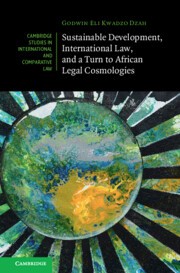Book contents
- Sustainable Development, International Law, and a Turn to African Legal Cosmologies
- Cambridge Studies in International and Comparative Law: 185
- Sustainable Development, International Law, and a Turn to African Legal Cosmologies
- Copyright page
- Dedication
- Contents
- Foreword
- Preface
- Acknowledgements
- Abbreviations
- Introduction
- Part I Mise en Scène
- Part II Universal, Pluriversal, and in Between
- 3 Sustainable Development and the Paradox of Legal Universalism
- 4 Problematising the Normative Trajectory of Sustainable Development in Africa
- Part III Thinking Alternatives
- Bibliography
- Index
- Cambridge Studies in International and Comparative Law
3 - Sustainable Development and the Paradox of Legal Universalism
from Part II - Universal, Pluriversal, and in Between
Published online by Cambridge University Press: 16 May 2024
- Sustainable Development, International Law, and a Turn to African Legal Cosmologies
- Cambridge Studies in International and Comparative Law: 185
- Sustainable Development, International Law, and a Turn to African Legal Cosmologies
- Copyright page
- Dedication
- Contents
- Foreword
- Preface
- Acknowledgements
- Abbreviations
- Introduction
- Part I Mise en Scène
- Part II Universal, Pluriversal, and in Between
- 3 Sustainable Development and the Paradox of Legal Universalism
- 4 Problematising the Normative Trajectory of Sustainable Development in Africa
- Part III Thinking Alternatives
- Bibliography
- Index
- Cambridge Studies in International and Comparative Law
Summary
Chapter 3 analyses the normativity of sustainable development in international law and politics as expressed beyond the questions on its present (domestic) manifestations or the endless struggle to place the concept within general legal (normative) registers. It highlights how international law tends to subordinate non-Western experiences in its elevation of sustainable development into a global standard. What emerges from this process is that the more the world pursues sustainable development in its current form, the more we unwittingly contribute to the global dissemination of a particular strand of Eurocentrism. Sustainable development thus reveals itself as an amalgam of power and knowledge while simultaneously establishing itself as a vital component in international legal governance. What emerges in this chapter is that, although the concept of sustainable development is always at the forefront of international public discourse, little is done, in fact, to achieve its presumed objectives. Thus, while sustainable development’s quick ascent to become a universalist concept is central to this book, the concept’s character must be understood as quietly operating to mute global ecological violence that disproportionately affects marginalised peoples in the Global South.
Keywords
- Type
- Chapter
- Information
- Publisher: Cambridge University PressPrint publication year: 2024



